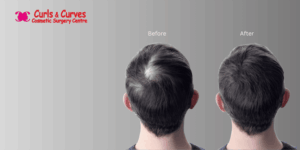Bariatric surgical treatment is a transformative procedure that can change a person’s life in an endurable way by helping them lose a significant amount of weight. This type of weight loss surgery—including gastric bypass, sleeve gastrectomy, and other procedures—alters the gastrointestinal tract to aid in losing weight and managing morbid obesity. However, despite its benefits, surgical weight loss often triggers some recurring issues that patients must deal with, one of which is excess skin. After massive weight loss, patients are oftentimes left with loose, sagging skin, which can cause both aesthetic and health concerns. Read on to learn why it is essential to remove excess skin after weight loss surgery, the challenges it poses, the advantages of skin removal procedures, and lifestyle tips to ensure long-term success after bariatric surgery.
The Impact of Rapid Weight Loss on the Skin
Losing a substantial amount of weight rapidly as commonly happens after bariatric surgery, can leave the skin struggling to adjust. Human skin has a natural elasticity, but when it has been stretched for extended periods due to morbid obesity, it loses its ability to snap back to its original shape. As a result, individuals who undergo surgical weight loss often find themselves dealing with sagging or hanging skin on areas such as the stomach, arms, thighs, and chest.
This excess skin is more than just a cosmetic issue. It can lead to discomfort, difficulty in managing obesity post-surgery, and even serious health risks.
Health Risks Associated with Excess Skin
Loose skin after significant weight loss surgery can lead to various health problems, significantly affecting the patient’s quality of life. Here are some health issues associated with excess skin:
- Skin Infections: Excess skin creates folds that trap moisture, providing the ideal conditions for bacteria and fungi to thrive. This increases the risk of skin conditions such as intertrigo (inflammation of skin folds), yeast infections, and cellulitis (a serious bacterial infection). Persistent inflammation in these areas can also lead to rashes, sores, and unpleasant odours.
- Chafing and Discomfort: Loose skin, particularly in the thighs and underarms, can rub against itself, causing painful chafing. The constant friction can cause the formation of blisters and open wounds, which are susceptible to infections. These wounds can limit a person’s physical activity, which is crucial for maintaining the results of surgical weight loss.
- Mobility Issues: Excess skin, especially around the abdomen and arms, can act as extra weight, making it difficult to move freely. This can hinder basic activities such as walking, exercising, or even simple daily tasks like bending over. Restricted mobility can become a significant obstacle for those trying to stay active and continue managing obesity post-surgery.
- Poor Posture and Back Pain: The additional weight from sagging skin can negatively impact posture and lead to back pain. The strain on muscles and joints, particularly in the lower back, can make it difficult to maintain proper posture and spinal alignment.
The Emotional Impact of Excess Skin
Excess skin can also have a profound emotional impact on patients who have undergone weight loss surgery. Many people envision being happier and more confident once they achieve their weight loss goals, but loose skin can prevent them from fully embracing their new body. This can lead to feelings of self-consciousness, frustration, and dissatisfaction with their physical appearance.
In some cases, this emotional toll can lead to psychological issues like low self-esteem, body dysmorphia, or even depression. For many individuals, post-bariatric surgery skin removal not only offers physical benefits but also provides emotional healing and a boost in body confidence.
Benefits of Bariatric Skin Removal Surgery
For those struggling with excess skin after surgical weight loss, post-bariatric body contouring surgeries offer an effective solution. These procedures help remove the excess skin, tighten the underlying tissues, and reshape the body for a smoother, more natural appearance.
Here are some of the key benefits of skin removal surgery:
- Improved Hygiene: Removing excess skin significantly reduces the risk of infections, rashes, and skin irritation. Without folds and creases where moisture and bacteria can accumulate, patients can maintain proper hygiene more easily, which lowers the likelihood of skin-related health issues.
- Increased Comfort and Mobility: Once the excess skin is removed, patients often feel lighter and more comfortable. Improved mobility enables them to engage in physical activities like walking, stretching, and exercising more freely, which is critical for maintaining weight loss and overall health after bariatric surgery.
- Better Posture and Reduced Back Pain: By removing excess skin, particularly in the abdominal area, patients can achieve better posture and reduce back pain. Alleviating the extra weight that pulls on the lower back helps patients maintain proper spinal alignment and core strength.
- Enhanced Confidence and Body Image: One of the most significant benefits of post-bariatric skin removal is the emotional boost it provides. Patients often report feeling more confident, comfortable in their own skin, and happier with their appearance after the procedure, allowing them to fully appreciate the results of their weight loss surgery.
Lifestyle Tips for Managing Life Post-Bariatric Surgery
After undergoing bariatric surgery or surgical weight loss, maintaining your new body and staying healthy requires a commitment to lifestyle changes. Here are some essential tips to help you adjust after the surgery and ensure long-term success in managing obesity and maintaining your weight loss:
-
- Follow a Balanced Diet
Maintaining a nutrient-rich diet is essential after weight loss surgery to support your new digestive system and help with continued weight loss. Your meals should include a balance of:- Lean proteins: Chicken, fish, eggs, and plant-based proteins help maintain muscle mass and keep you feeling full.
- Vegetables and fruits: These provide necessary vitamins and minerals while being low in calories.
- Healthy fats: Avocados, nuts, and olive oil support overall health and help you absorb essential nutrients.
Avoid sugary and high-fat foods that can slow down your progress. Eating smaller, more frequent meals can help you manage portion sizes and prevent overeating, which is crucial for maintaining the benefits of your weight loss surgery.
- Stay Hydrated
Proper hydration is key for maintaining health post-surgery. Drink at least 8 cups of water a day to help digestion, keep your skin healthy, and prevent dehydration. Avoid sugary drinks, sodas, and alcohol, as they lead to weight gain and can cause complications after surgical weight loss. - Exercise Regularly
Physical activity plays a crucial; role in managing obesity and maintaining long-term weight loss after surgery. Focus on activities that suit your fitness level and are easy on your joints, such as:- Walking: Start with daily walks to improve mobility and cardiovascular health.
- Strength training: Light weightlifting helps build muscle, which can boost your metabolism and improve overall body tone.
- Yoga or Pilates: These activities can help improve flexibility, posture, and mental health.
Consult with your healthcare provider before starting any new exercise regimen, especially after weight loss surgery, to ensure that it’s safe for you.
- Practice Good Skin Care
After surgical weight loss, excess skin can cause discomfort or skin irritations like rashes and infections. Practicing good skin hygiene can help you manage these issues:- Use moisturising lotions to keep your skin hydrated.
- Gently clean skin folds to prevent infections caused by trapped moisture.
- If you’re experiencing significant discomfort from excess skin, consult with your doctor about potential post-bariatric skin removal surgery options.
- Maintain Regular Checkups
After bariatric surgery, regular checkups with your healthcare provider are essential to monitor your progress, ensure that your body is getting all the nutritional needs fulfilled, and prevent potential complications. Your doctor will guide you on how to maintain your weight loss and help you address any concerns that arise during your post-surgery journey. - Focus on Mental Health
Weight loss is not only a physical journey but also a mental one. Post-surgery, it’s common to experience emotional challenges such as body image issues or adjusting to new eating habits. To maintain long-term success, it’s important to:- Seek support from a therapist or support groups that specialise in surgical weight loss.
- Practice mindfulness and stress management techniques, like meditation or journaling, as these help you stay focused and emotionally balanced.
- Celebrate your progress and milestones, focusing on your achievements rather than potential setbacks.
- Wear Comfortable and Supportive Clothing
Wearing comfortable, well-fitting clothing that supports areas with excess skin can help you feel more at ease post-surgery. Some individuals find that wearing compression garments can reduce discomfort and improve their confidence as they continue their weight loss journey.
Key Takeaways
For individuals who have successfully undergone surgical weight loss, excess skin can be an unexpected challenge. Not only does it affect mobility and comfort, but it can also cause health complications and emotional distress. Bariatric skin removal surgery offers a comprehensive solution, improving both physical and emotional well-being, allowing patients to fully relish the results of their weight loss surgery journey.
By following the lifestyle tips mentioned—such as maintaining a balanced diet, staying active, practising good skincare, and focusing on mental health—you can achieve sustainable results and continue living a healthier, more fulfilling life post-surgery.Is Excess Skin Affecting Your Life After Bariatric Surgery? Curls & Curves Has the Solution!
If you’ve experienced rapid weight loss and are dealing with the discomfort of excess skin, post-bariatric skin removal surgery may be the right solution for you. At Curls & Curves, we specialise in skin removal procedures that help patients regain comfort, mobility, and confidence. Schedule a consultation today, and we will help you manage the aftereffects of surgical weight loss and enhance your overall well-being.
- Follow a Balanced Diet





